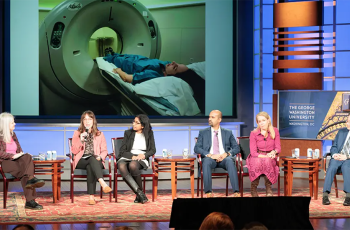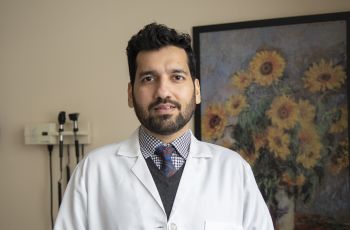While contestants on weight loss shows seem to easily shed pounds, dealing with obesity – and its myriad accompanying health issues – is not as simple. Obesity is a multifactorial and treatable disease, says Marijane Hynes, MD, clinical professor of medicine and founder of the Weight Loss Clinic at the George Washington University (GW) Medical Faculty Associates (MFA). Here, she explains what physicians and individuals, as well as government and city planners, can do.
How do you measure obesity?
Hynes: We measure obesity with the Body Mass Index (BMI), which is based on height and weight, but it is not a perfect system. For example, if you are a weightlifter, you might come across as overweight or obese because your muscles weigh more than the average person. The BMI also does not include a measurement of visceral fat, which is excess fat around your waist. This is important as it is a risk factor for many chronic diseases, such as sleep apnea, diabetes, cancer, renal disease, and more. For women, their waist should be under 35 inches, and for men, under 40 inches.
Obesity is defined as a BMI over 30 kg/m2, and overweight is a BMI between 25 and 29.9 kg/m2. As the BMI increases, so does the risk for disease, especially for those with a BMI over 35 kg/m2. A BMI over 40 kg/m2 is considered severe disease.
How prevalent is obesity in the United States?
Hynes: It is incredibly prevalent. About 40% of American adults have obesity, and 71% have a BMI over 25, so they are overweight or obese.
Are there any factors, such as behavior, genetics, or the environment, behind obesity?
Hynes: Obesity is multifactorial. To be healthy, we need to sleep well, exercise, and eat a healthy diet.
Most obesity is due to the types and amounts of food we eat. A lot of processed food is more caloric than real food, meaning food in its natural source is less fattening than, say, the macaroni and cheese you buy in the box. Two-thirds of the American diet is processed, which means it has changed from its original form. Processed foods contain ingredients such as phosphates, which are not on the label but allow for longer shelf life and they make food taste better. They usually contain more salt as well. In fact, most of our salt intake is from processed foods, not what comes out of the saltshaker. In addition, with processed foods, the hunger signals are not the same, so people just end up eating more food.
Eating mostly plants and whole foods – foods in their original form, such as apples – is a great idea. There is no perfect diet, despite all the discussions in publications. There is enough evidence to say that refined sugars, processed foods, and processed meats (anything smoked, barbecued, or cured) is not good for you and should be limited.
Less sleep can also be a factor. If you do not get about 7.5 hours of sleep a night, the hormones that make you hungry increase. When people have less than six hours of sleep, they eat an average of 400 more calories a day, and this [effect] has been studied.
Genetics does not really play a huge role in obesity because, even if you are more likely to be heavier than your counterpart or your next-door neighbor, it does not mean that you are going to be obese; you may just have to be more careful [with your eating habits] or work out more. There are some diseases that cause you to be obese, but they are rare. Medications, such as antidepressants, also contribute to weight gain, and some medications, even antihistamines, can increase weight.
The pandemic has been an issue in people getting less exercise; how we work may forever be changed, with more people working from home. When working from home, people tend to sit most of their day, and when people sit all day, they tend to be hungrier and make poor eating choices. [Sitting for long periods] can also affect your insulin [a hormone that regulates glucose, or sugar, in the blood]. For some people, as they get obese, their insulin increases, but cells cannot use it easily and they become insulin resistant, which makes it harder to lose weight.
What is an example of a meal, such as breakfast, that does not have processed foods in it?
Hynes: Whole grain oatmeal (not the packets), fruit, and almond milk. A sprinkling of nuts would make it a good breakfast.
What kind of health issues can accompany obesity?
Hynes: Diabetes, osteoarthritis, psoriasis, migraines, sleep apnea, hypertension, asthma, COPD (chronic obstructive pulmonary disease), atrial fibrillation, cardiac disease, hyperlipidemia, high cholesterol, and even cancer. Some of these diseases can start in patients who are overweight, but many appear once the BMI is over 35, especially [in those] with visceral fat.
If somebody is obese and wanting to lose weight, what is a reasonable weight loss goal?
Hynes: We recommend starting with 5-10% of their body weight. A 10-15% weight loss can put diabetes in remission, improve atrial fibrillation and liver disease, and help immensely with knee pain due to osteoarthritis.
What strategies would you recommend to help prevent obesity? Is there a way to stop it before it starts?
Hynes: That is really the most important thing that we should be doing: working on preventing obesity because once the weight is on, it is exceedingly difficult to get off. Any type of physical activity that people enjoy really should be encouraged.
On a community level, parks should have good walking paths and people should be able to walk on sidewalks on their streets. The U.S. government could also fund plant-based diets, which does not mean that everyone must only eat plants, but just eat mostly plants. Currently, the U.S. subsidizes $17 billion to meat farming, but less than 1% of that to vegetables and plants. Cattle farming contributes to climate change as well. The government could make sure that people in the Supplemental Nutrition Assistance Program are getting healthier foods. Aiding people financially helps them eat better; we know that people of lower socioeconomic status tend not to eat as well because processed foods can be less expensive and more accessible.
We also need to teach people how to eat. We have a culinary medicine program at GW, and studies have shown that if you teach people how to cook and, for example, make vegetables taste good, people will have healthier diets.
How can the GW MFA help patients struggling with obesity?
Hynes: We work with the patients and see obesity as a treatable disease. We work with a multidisciplinary team; we have a dietitian, and we have a resident psychiatrist who sees patients for associated problems such as depression and anxiety. At the GW Weight Loss Clinic, we are also teaching our medical residents how to take care of these patients. The residents are our future, and they are genuinely concerned about preventive care and nutrition.
We can give medications for obesity, which can help someone lose weight. People who have never had weight issues are under the misconception that you just have to push yourself away from the table and you will lose weight. Once the weight is on, though, it really is difficult to get off, so people do need help. Also, people feel sad when they are overweight or obese, and they think it is their fault, but they really do need help in handling it, just like any disease.
What is important for people to know about obesity?
Hynes: We should think about obesity as more of a disease that we can help people with. There is a weight bias that people who are obese do not have good willpower, and as physicians, we need to look at it as a disease that is treatable. The patients need to think that way too.
To make an appointment, visit the GW MFA Weight Loss Clinic or call 202-741-2222.




